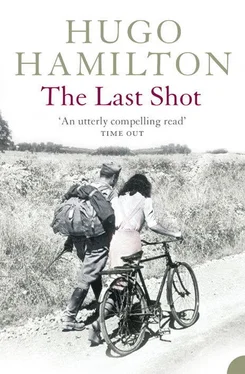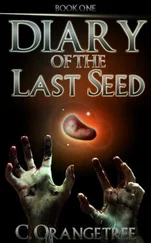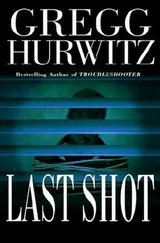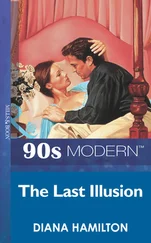Bertha said nothing. She kept walking as though she could pretend at any moment to have heard nothing. Why was this officer so interested in her welfare? She searched for motives. Gave no hint of collusion. She listened.
‘This may be your last chance to get back to Germany. The people in our garrison may never see their homes again…’ Officer Kern hesitated. ‘I want to offer you that chance, at least.’
When Officer Kern unexpectedly looked into her eyes she may have unconsciously given him some encouragement, because he began to unveil his plan as they walked.
‘At eleven o’clock this evening,’ he said, ‘you will see a Lazarett vehicle marked with the Red Cross by the main gates. It’s there every night. If you’re sitting in that truck by half-eleven, you’re with us. There are three of us. There is room for one more. Bring only one light bag and don’t let anyone see you.’
She acknowledged nothing and gave no indication whether she would be there or not. She felt that Officer Kern had shown her enormous trust. An almost indecent trust. She could have gone straight back and reported the plan, though it would be unlike her to do so. But she was afraid that she had already been dragged into a conspiracy by his talk. The fact that such an offer was put to her would force her to consider it. One way or the other, she would have to answer.
He told her to think it over. It was up to her. He would not be offended if she ignored it.
‘Just remember, Fräulein Sommer, when the Russians get to Laun, we can expect very little sympathy from them, or the Czechs. You know what’s happened around these parts. They’ll all be hungry for revenge. All these Sudeten Germans will be for it.’
She thought she knew what he was referring to. The occupation of Czechoslovakia. She knew nothing more. She knew nothing of Theresienstadt, forty kilometres east of Laun along the same river. She could imagine nothing like it. She walked into the church. Officer Kern held the large oak door open for her, nodded and stepped back outside, where he waited for her to pray and make up her mind. He was Lutheran. He stood at the bottom of the steps outside.
Inside, Bertha Sommer kneeled once again before the massive wooden carving which covered the end wall of the church behind the altar. The interior of the church had become so familiar to her over the months she had spent in Laun that her opinions began to repeat themselves. The great wood carving seemed a little out of place for this small church; it belonged more to a cathedral. The May altar for Our Lady was decorated with extra flowers. She tried to keep her mind on the Mass. She tried to put everything secular out of her head.
If you want to know what Bertha Sommer did during the Second World War: she prayed. That morning, though, she could hardly concentrate. Nothing could keep out the fragile reality of her situation in Laun. She kept wondering whether she would ever see her home again; her mother, her sisters, her aunt, her home town of Kempen. Struck by a sudden impatience, she wanted to go home that minute, and involuntarily she began to weigh up Officer Kern’s plan for escape.
Bertha prayed for guidance. She expected somehow to be given a divine signal. During the course of Mass she changed her mind at least a half-dozen times. She could not come to terms with the idea of desertion. It was dishonest, and dangerous. She kept thinking about Officer Kern’s subversive proposal. Could she trust him, she wondered. She had nobody to talk to about it but God. She would let God decide.
The barber’s shop on Prag Strasse in Laun was busy that morning. It could have been taken for some kind of symbol or national expression of independence that men arrived early to get their hair cut. Apart from Mass at the church of St Nicholas, it was the only good excuse any man could invent to be seen so early. The horizontal blinds of this front-room barber’s shop gave an excellent view on to the main street, on to the pub across the road and everything that moved through the town.
There was a group of men waiting to have their hair cut, four men and a small Down’s Syndrome boy who stood by the window. They all had seen the new armoured patrol arrive to replace the night patrol on the square. And the German woman on foot, in her red coat, along with a German officer.
The men sat along a wooden bench and said nothing. They felt the silent, reflective moment that all men feel before their turn comes up in the barber’s chair, the moment preceding change. From time to time they found something to whisper about. Occasionally the barber joined in with a discreet word in somebody’s ear as he drew the sheet up and stuffed it into the collar of his next customer. But the clicking of scissors took over and covered everything with a feverish whisper of its own.
The boy with Down’s Syndrome clapped when his father settled into the barber’s chair. He ran back and forth to the window, excited about everything, occasionally receiving a smile of acknowledgement from the men along the bench. He had red hair. Saliva ran down to his chin and there was a damp stain on his chest where it collected. He was no more than four years of age. Born during the war. The very existence of a boy with Down’s Syndrome was an overt act of revolution in the Reich.
The Czech liberation came late. They could have waited for the Russians but they were anxious to strike a blow for independence. A home-made revolution.
Throughout April the resistance movement had obstructed German military movement by bombing railways, disabling locomotives, tanks, armoured units and generally supporting the Russian advance. The aim was to be a nuisance. They blew up fuel reserves, and when the German Army resorted to using alcohol to power their vehicles, the Czechs began to spill bottles and barrels of schnapps and slivovitz into the streets; bottles they would soon need to celebrate victory when they were eventually liberated.
The men in Laun were waiting for the signal. They were already aware that on the previous day men from the nearby mining town of Kladno had marched to Hriskov, south of Laun, with no more than a ration of cigarettes in their pockets, to take over the German arms dump there. The Czechs needed weapons. In Prague, they planned to fight with furniture. With barricades. In another north Bohemian town, the people tried to do without weapons altogether and came out on the streets for a peaceful protest, a premature but unsuccessful attempt at the velvet approach. General Schörner told his troops ‘to quell any such disturbances with the most ruthless force’.
The men at the barber’s shop in Laun were waiting for the right moment to assemble and form a National Committee of independent Czechoslovakia. All they needed was a leader. They sat watching the boy with Down’s Syndrome playing with the cords of the blinds by the window. The boy groaned in a world of his own. Occasionally, he turned around and addressed one of the men without the slightest hint of shyness, his upper lip drawn up toward his nose, genetically disfigured into a permanent smile.
‘Who’s next?’ the barber asked, knowing that a son follows after a father.
The boy sat down on his father’s knee and allowed the barber to hang a sheet around him and tuck it under the collar. It was all new to him. He was silent, reassured by his father’s words, until the barber began to clip rhythmically with the scissors. ‘There’s a good boy,’ the barber kept saying. But even before the scissors had touched the boy’s hair, he began to struggle and make life difficult. The white sheet had already come undone. There was no point in putting it back. Instead, the barber manoeuvred himself around the chair as best he could to try and get at the boy’s hair.
Читать дальше
Конец ознакомительного отрывка
Купить книгу












